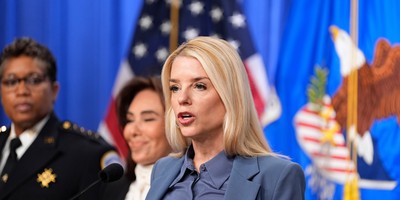WASHINGTON - Federal spending is exploding under Barack Obama, shattering every record for budget deficits, public debt and annual expenditures.
So much so that a term like "Big Government" fails to adequately define the fiscal wreckage that has occurred under his presidency.
Like the endlessly anemic economy his jobless policies have spawned, you don't hear much, if anything, about wasteful, ineffective federal spending on the nightly news. Nor from Obama and his party -- ever.
Yet the evidence of skyrocketing spending is there for all to see, growing grotesquely higher with each passing year, leaving behind mountains of economy-crushing debt for future generations to pay.
The publicly-held debt -- what we've borrowed to meet the government's spending bills -- is nearly $11 trillion. The gross federal debt -- the sum total of all our borrowing and the future liabilities and benefits we've promised to pay -- is approaching $17.9 trillion.
Throw in another $4 trillion if you want to include all state and local government debt, too.
Annual spending mushroomed to $3.6 trillion in 2014, and will rise to $3.9 trillion in fiscal 2015, then surpass $4 trillion in fiscal 2016 during Obama's last year in office.
Obama's spending set a record for annual deficits as well as a multi-trillion dollar deficit record in his first four years.
Between 2009 and 2012, when he won election to a second term, he had run up more than $5 trillion in red ink: $1.4 trillion in 2009; $1.29 trillion in 2010; $1.3 trillion in 2011; and more than $1 trillion in 2012.
The obscene deficits continue in his second term: $680 billion in 2013; $649 billion in 2014; and an estimated $564 billion in 2015.
The deficits of the previous four years were much lower under President George W. Bush: $318 billion in fiscal 2005; $245 billion in 2006; a tame $161 billion in 2007; and $458 billion in 2008.
Recommended
In Obama's first four years in office, he had added over four times more to the federal government's monster debt -- a whopping $5 trillion -- than his predecessor Bush did in his last four years as president -- $1.18 trillion.
No other president in our history has spent more than Obama over this period. No president has piled up as much debt as fast as Obama, nor run up anywhere near the unprecedented deficits he's recorded in each of his first four budgets.
His last three estimated budgets deficits, all well above the half trillion dollar level, suggest that he will leave office with the highest debt accumulation in U.S. history.
On February 23, 2009, when he had been in office for about a month, Obama told us: "Today I'm pledging to cut the deficit we inherited in half by the end of my first term in office."
He wasn't even close. When he was running for re-election in the fall of 2012, the budget deficit was headed well over $1 trillion. By the time he began his fifth year in office, the deficit was skirting close to $700 billion.
When Obama signed his $800 billion job stimulus bill, he said it would bring down the unemployment rate and get the economy growing again.
But what most voters did not know is that much of the money a Democratic Congress gave him was plowed into an alphabet list of federal agencies and programs that had little or nothing to do with creating private sector jobs or boosting economic growth.
"Obama turned a temporary expansion of government, through TARP and the auto bailouts, into a permanent expansion of government," writes Stanford University economist Keith Hennessey.
"Before Obama, federal spending averaged 20 percent of GDP for decades. Now he is presiding over a much bigger government, at 24 percent of GDP," Hennessey said.
The surge in federal spending under this administration, and a tsunami-driven wave of crushing debt, threatens our country and its economy as never before.
Much of it occurred in the first two years of Obama's reign when Democrats controlled the House and Senate and Obama signed spending bills as fast as he could get them.
The 2010 Republican takeover of the House slowed that spending orgy with a string of budget-cutting bills that died in the Senate. But that still meant decades of wasteful and outdated programs and agencies continued piling up debt.
Sadly, however, there are few champions of spending reductions, outside of House Budget Committee Chairman Paul Ryan. But the Democratic-run Senate, and Obama, remain his fiercest obstacles for the time being.
Other GOP lawmakers have come forward to attack a litany of needless, forgotten, waste-ridden agencies, but have won few victories.
Sen. Tom Coburn, a country doctor from Muskogee, Okla., won voter acclaim for his yearly Wastebook list that exposed one spending scandal after another. But his fiery attempts to abolish needless programs ran into a wall of political opposition from Democrats and special interests.
The last president who made a concerted effort to kill dozens of agencies and programs was Ronald Reagan, whose budget director, David Stockman, compiled a thick directory of programs that cried out to be abolished or cut back.
Yet, in the end, he, too, was defeated at every turn on Capitol Hill by a bipartisan cabal of spendthrift lawmakers who fought him tooth and nail.
Many of the programs on his list came from my 1980 book, FAT CITY - How Washington Wastes Your Taxes, that Reagan handed out at his first Cabinet meeting. But only a handful were eliminated, and not without a fight.
Cutting, consolidating and reforming government from top to bottom should be the No. 1 issue this year and in the 2016 presidential election.
But is there a courageous leader out there with the guts to fight for this cause to save America from those who are recklessly spending it into oblivion?

























Join the conversation as a VIP Member